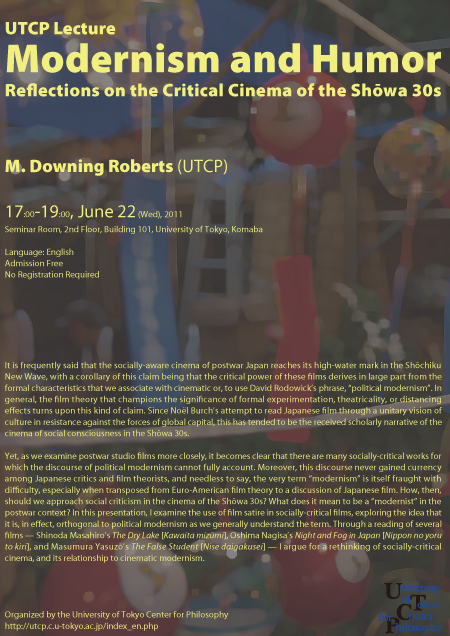
|
Title: | UTCP Lecture "Modernism and Humor: Reflections on the Critical Cinema of the Shōwa 30s"Finished |
||
|---|---|---|---|---|
| Date: | 17:00-19:00, Wednesday, June 22, 2011 |
Place: | Seminar Room, 2nd Floor, Building 101, University of Tokyo, Komaba |
|
Speaker: M. Downing Roberts (UTCP)
Abstract:
It is frequently said that the socially-aware cinema of postwar Japan reaches its high-water mark in the Shōchiku New Wave, with a corollary of this claim being that the critical power of these films derives in large part from the formal characteristics that we associate with cinematic or, to use David Rodowick’s phrase, “political modernism”. In general, the film theory that champions the significance of formal experimentation, theatricality, or distancing effects turns upon this kind of claim. Since Noël Burch’s attempt to read Japanese film through a unitary vision of culture in resistance against the forces of global capital, this has tended to be the received scholarly narrative of the cinema of social consciousness in the Shōwa 30s.
Yet, as we examine postwar studio films more closely, it becomes clear that there are many socially-critical works for which the discourse of political modernism cannot fully account. Moreover, this discourse never gained currency among Japanese critics and film theorists, and needless to say, the very term “modernism” is itself fraught with difficulty, especially when transposed from Euro-American film theory to a discussion of Japanese film. How, then, should we approach social criticism in the cinema of the Shōwa 30s? What does it mean to be a “modernist” in the postwar context? In this presentation, I examine the use of film satire in socially-critical films, exploring the idea that it is, in effect, orthogonal to political modernism as we generally understand the term. Through a reading of several films — Shinoda Masahiro’s The Dry Lake [Kawaita mizūmi], Oshima Nagisa’s Night and Fog in Japan [Nippon no yoru to kiri], and Masumura Yasuzō's The False Student [Nise daigakusei] — I argue for a rethinking of socially-critical cinema, and its relationship to cinematic modernism.
Language: English
Admission Free
No Registration Required
→ [Report]

Download (PDF, 26.9MB)






